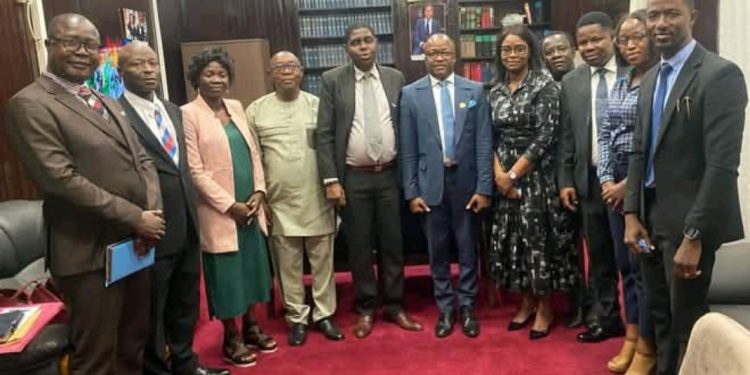By Hassan Osman Kargbo
The Right to Access Information Commission (RAIC), Wednesday, 26th March 2025, engaged in a significant high-level meeting with the Judiciary of Sierra Leone to foster collaboration in the enforcement of the Right to Access Information (RAI) Law.
The meeting, which was held at the Chamber of the Chief Justice at the Law Court Building- Siaka Stevens Street, sought to strengthen the partnership between the judiciary and RAIC in ensuring transparency and public accountability.
The meeting was chaired by Dr. Ibrahim Seaga Shaw, Chairman and Information Commissioner of RAIC, who emphasized the Commission’s pivotal role as a bridge between public authorities and information seekers.
Dr. Shaw reminded the Judiciary of its obligations under the RAI Act, noting that as a public authority, the Judiciary must adhere to the law’s provisions.
He highlighted the ongoing appeal case between civil society activist Martha Kargbo and the Bank of Sierra Leone, where the Bank is contesting RAIC’s decision, underscoring the importance of the Judiciary’s role in these cases.
In his address, Dr. Shaw also acknowledged the Judiciary’s positive response to an information request made by Abdul Fatoma, a well-known civil society activist, further emphasizing the need for timely completion of Annual Compliance Reports by the Judiciary and adherence to the Proactive Disclosure of Information scheme, noting that such steps are crucial in ensuring that the public’s right to information is protected and upheld by all public bodies, including the Judiciary.
Chief Justice, Hon. Justice Komba Kamanda, who led the Judiciary delegation, expressed his appreciation for RAIC’s ongoing engagement with public authorities, and reaffirmed the Judiciary’s commitment to fulfilling its obligations under the RAI Act.
Justice Kamanda highlighted recent judicial reforms under his leadership, including the appointment of supervisors to oversee different levels of the court system, a move intended to expedite case hearings and address the backlog of pending cases. Such efforts, according to the Chief Justice, are part of a broader agenda to improve the efficiency of the Judiciary.
However, Justice Kamanda also called for an amendment to the RAI Act, suggesting that the RAIC should be granted enforcement powers similar to those of the Anti-Corruption Commission (ACC) and the Political Parties Regulatory Commission (PPRC), arguing that such would enhance the Commission’s ability to hold public authorities accountable and ensure greater compliance with the RAI Law.
A major concern raised during the meeting was the issue of Sierra Leone’s limited judicial capacity. Currently, there are only 32 active judges serving a population of approximately eight million. While acknowledging this challenge, Justice Kamanda reassured the meeting that efforts are being made to ensure that credible judicial appointments are made in the future to address the shortage.
Hon. Justice Alusine Sesay, a senior judge, welcomed the RAIC’s initiative to engage the Judiciary in a collaborative manner. He noted that the Judiciary has already made strides toward transparency, including the establishment of a website and a dedicated Communication and Public Relations Unit. However, he raised concerns regarding the exemptions provided in the RAI Act, particularly regarding information that is sub-judice, or currently under judicial consideration.
In response, Dr. Shaw clarified that the RAI Act does include exempt provisions, specifically in Part 3, Sections 12-26, which outline situations where certain information can be withheld, including information that is sub-judice. He emphasized that the RAIC often has to balance the release of public information with the need to protect sensitive content, and in such cases, the public interest test is applied to determine whether disclosure is appropriate.
Hon. Justice Fatmata Bintu Alhadi, a Justice of the Court of Appeal, also reaffirmed the Judiciary’s status as a public body, while acknowledging the unique sensitivities it faces. She commended Chief Justice Komba Kamanda for making the Judiciary more open and accessible, noting that there has been a significant shift towards greater transparency and accountability under his leadership.
Both RAIC and the Judiciary agreed to strengthen their collaboration, including organizing capacity-building initiatives for their members to enhance the implementation and enforcement of the Right to Access Information Act. This commitment to improved cooperation marks a significant step toward ensuring that Sierra Leone’s public bodies are held to the highest standards of transparency and accountability.










